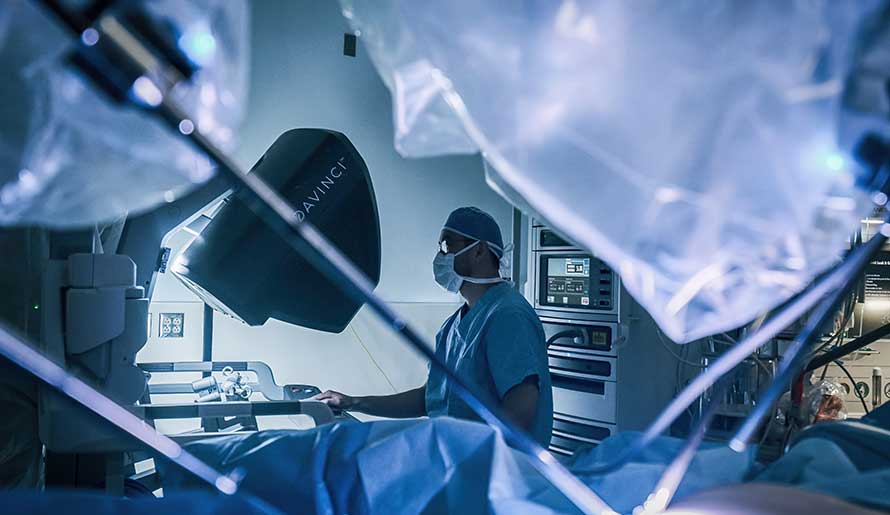Transoral Robotic Surgery (TORS)

Transoral robotic surgery (TORS) is an exciting breakthrough in the treatment of certain head and neck cancers and is routinely performed at Moffitt Cancer Center—Florida’s No. 1 cancer hospital. This minimally invasive, robotic-assisted procedure allows surgeons to access challenging areas of the mouth and throat and remove tumors that once required large incisions—and involved substantial risk—to reach.
What cancers does transoral robotic surgery treat?
Transoral robotic surgery is an FDA-approved treatment that may be a viable option for patients with certain types of head or neck cancer, including:
- Oropharyngeal cancer – Cancer that begins in the back of the throat, base of the tongue or tonsils.
- Hypopharyngeal cancer – Cancer that develops toward the lower part of the throat.
- Laryngeal cancer – Cancer of the voicebox, located above the windpipe.
How is transoral robotic surgery performed?
Transoral robotic surgery is performed under general anesthesia with the assistance of the state-of-the-art da Vinci® Surgical System. This innovative tool allows surgeons to complete intricate movements not possible with the human hand alone, providing an unparalleled level of surgical precision, dexterity and visualization.
Utilizing this computer-assisted technology to control small instruments, the surgeon will gently insert a special camera into the patient’s mouth or throat that sends detailed, 3D images of the surgical site to a monitor in the operating room. Additional robotic instruments are then used to carefully separate tissues and remove tumors through the mouth with minimal disruption to surrounding structures in the throat. By keeping important structures intact and minimizing incisions, TORS helps ensure the best possible outcome for patients.
What are the benefits and risks of transoral robotic surgery?
Transoral robotic surgery’s minimally invasive approach offers multiple advantages to patients. When compared to a traditional open procedure, TORS involves:
- Less time under general anesthesia
- A lower risk of surgical complications
- Less surgical blood loss
- Less postoperative discomfort
- A quicker recovery period
- A shorter hospital stay (typically one to two days, as opposed to a week or longer)
- A reduced need for additional treatments such as chemotherapy or radiation therapy
- A faster return to eating, drinking and speaking (often the next day)
- No visible scarring
Any surgery - even an advanced robotic procedure - involves some measure of risk. Possible complications of TORS include abnormal bleeding, difficulty swallowing, respiratory compromise (a lack of oxygen in the lungs) and lung aspiration (when liquid or food enters the lungs). Furthermore, TORS may not be appropriate for patients with advanced-stage cancers or airway issues.
Learn more about head and neck cancer treatment at Moffitt
Transoral robotic surgery and other robotic-assisted procedures are routinely performed by the skilled surgeons at Moffitt Cancer Center. Our nationally recognized Head and Neck Cancer Program is home to a multispecialty team that focuses exclusively on treating malignant diseases of the mouth and throat and consistently achieves survival rates higher than national averages. By merging breakthrough technologies with individualized treatment and compassionate care, Moffitt is steadily improving outcomes and quality of life for patients with complex head and neck cancers.
Medically reviewed by Krupal Patel, MD, MSc, FRCS(C), FACS head and neck surgeon, Head and Neck–Endocrine Oncology Program.
Contact Moffitt Cancer Center at 1-888-663-3488 or complete a new patient registration form online if you’d like to consult with a physician about TORS, a head or neck cancer diagnosis or what treatment options may be best for you. A referral isn’t required to visit Moffitt, and we’re streamlining access to world-class cancer care by connecting patients to professionals as soon as possible.
